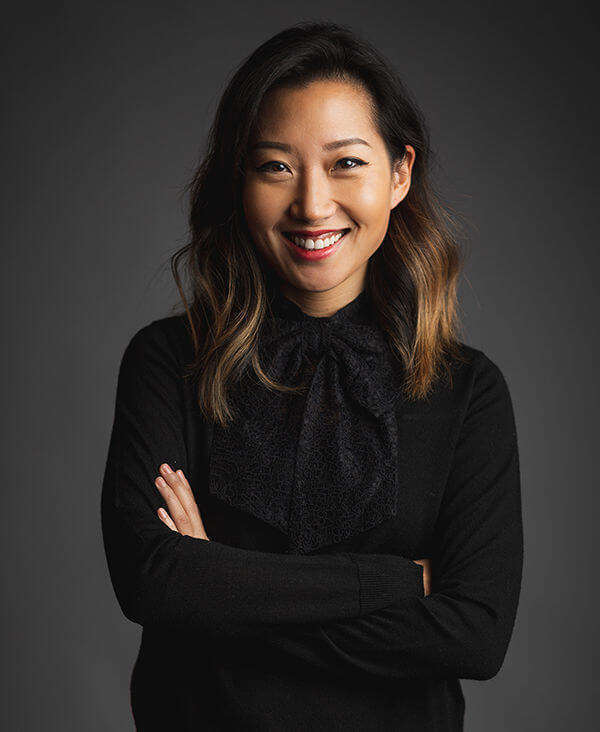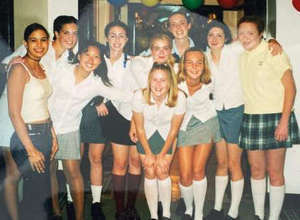
As a senior at Notre Dame, much of Grace Choi’s life on campus revolved around cooking.
It was 2003, and the Food Network was just taking off. Choi frequently watched Martha Stewart in her room in Walsh Hall, wandered grocery store aisles looking at the prices of ingredients, and cooked meals with a hot pot and rice cooker.
She also remembers spending weekend retreats cooking with the Asian American Association, the Filipino American Student Organization, and the Korean Student Association. Once, she even cooked a dinner for 120 people to raise money for her friend’s year of service.
“It really does open your eyes to the evocative power of food and the way it can forge connections,” Choi said.
Now, after a cookbook, a doctoral degree, and a spot on the Cooking Channel, she’s using emerging technology and her extensive knowledge of the role food plays in people’s lives to reinvent the idea of a recipe.
Exploring tangents
At Notre Dame, Choi chose to major in economics and enjoyed pursuing courses on statistics and the economics of education for her major, as well as classwork in psychology and theology.
Looking back, Choi appreciates the variety and balance of her Arts & Letters courses — which provided lessons she’s carried with her throughout the years.
“There’s something about the openness of a liberal arts program where you are encouraged to explore tangents,” Choi said. “Having that exercise as part of your academic training is one of the most important things that you can have — that exposure to different types of questions, to different disciplines and ways of thinking.”
After graduation, Choi initially decided that food should remain a hobby, and she moved to New York to take a position as a marketing assistant. One of her colleagues, a student at what is now the International Culinary Center, would bring in pastries. Choi, seeing what her colleague could accomplish through cooking, decided to enroll.
“I really wanted to look at food in an in-depth way,” she said, “and culinary school was the greatest entry point to it.”
“There’s something about the openness of a liberal arts program where you are encouraged to explore tangents. Having that exercise as part of your academic training is one of the most important things that you can have — that exposure to different types of questions, to different disciplines and ways of thinking.”
Food and the human experience
During and after culinary school, Choi experienced the food industry from different perspectives. She worked in restaurants. She lived in Italy for several months as a chef for an agriturismo — a farm where people can eat and experience farm life. She wrote an Italian vegetarian cookbook for the business.
But Choi’s interest in food went deeper than cooking. In her own family, in college, and beyond, she witnessed how food could bring people together and the emotional resonance favorite or familiar dishes could have.
She gravitated toward food studies, a multidisciplinary field that looks at food from the perspectives of science, history, politics, anthropology, psychology, and more.
“It’s such an important field to study because of its mundaneness, because of the necessity to eat in everyday life and to use food as a way to communicate one’s identity,” Choi said. “Food studies is really the study of the relationship between food and the human experience.”
Choi enrolled in a Ph.D. program in food studies at New York University, working with scholars like renowned psychologist Carol Gilligan to understand how people use food to communicate their ethnic identities.
A heightened meaning

In the meantime, she began looking for jobs and followed a lead to a bar, where it turned out the owner wanted to hire a bartender, not a chef. But a woman sitting at the bar turned to Choi and said she worked at the Food Network and that Choi should get in touch.
Choi put together a demo reel, sent it to the network, and started doing cooking demonstrations for The Cooking Channel, a Food Network spinoff. She ended up hosting her own short-form program, Cooking with Grace.
“I learned a lot, not just about being on camera — which is the least interesting thing for me — but about food production, communicating a recipe, and also communicating with brands,” she said.
Choi said her television work is what people know about, but it didn’t take up too much of her time — that went to her doctoral work.
For her dissertation, Choi interviewed people about the connection between food and ethnicity. In doing so, she realized that food took on a heightened meaning after the loss of a family member, such as a parent. She ended up exploring the role food plays in people’s memories, and in dealing with loss.
“Food is tied into so many types of things — like the relationships we have with people we eat with and how we use food as a form of social capital,” she said, “or how we cook and make certain things now as a way to reenact the experience of cooking with our parents or grandparents.”
“Food is tied into so many types of things — like the relationships we have with people we eat with and how we use food as a form of social capital, or how we cook and make certain things now as a way to reenact the experience of cooking with our parents or grandparents.”
‘Choosing our own adventure'
Choi, who received her Ph.D. in 2014, has also taught food studies courses at NYU and The New School of Social Research.
Most recently, however, she has combined her knowledge of cooking, business, education, and storytelling to launch Larabee, an interactive and voice-enabled multimedia platform for web or mobile that reimagines the way people pursue knowledge and know-how in the home, starting with cooking.
“The way we read now is very different,” Choi said. “It’s less linear and more dynamic. We’re clicking hyperlinks. We’re interacting with videos. We’re choosing our own adventure.
“For the first time in 200 years, we have the opportunity to reimagine the architecture of what a recipe looks like, with emerging technology and voice and video assistance.”
Years ago, it would have been difficult to predict the emergence of smart speakers, let alone their role in making dinner. But for Choi, Larabee is the culmination of everything she has learned and worked for.
“I saw the intersections of everything I had worked on converge into this one product — the education, the language, and the production aspects, creating an entertainment and utility platform that doesn’t exist yet,” she said. “I’m having the most fun with it.”
Arts & Letters, Choi said, helped her take her experience and expertise and apply it in new places, as she followed her interests.
“There’s a storytelling aspect that comes through in a liberal arts background,” she said. “Things feel a little more narrative-driven, looking at things as a web of experience to borrow heavily from. That’s pretty remarkable to have in your education.”
Originally published by at al.nd.edu on December 14, 2020.
